

The World's First Flourishing Manifesto To Radically Reinvent Work
the manifesto
The Global Flourishing Manifesto
Fuelled by a shared commitment to more equitable, humane, and inspirational workplaces.
A Necessary Transformation
Traditional performance management practices in organizations have long been plagued by significant challenges and frequent failures:
- Performance management often reinforces a myopic fixation on short-term profits and a limited perspective of individuals as mere cogs in the machine.
- Traditional performance management systems tend to foster a culture of fear and competition rather than collaboration, creativity and systemic flourishing.
- A heavy reliance on quantitative and financial metrics leads to a narrow focus on easily measurable outcomes, neglecting the importance of qualitative aspects, systemic, ecological and social impact and individual development.
- The emphasis on annual or biannual reviews often results in a retrospective and static evaluation, failing to capture the dynamic nature of employees' contributions.
- In spite of good intentions, many innovative practices fail to acknowledge available evidence and research, perpetuating existing shortcomings
- The time-consuming and bureaucratic nature of traditional performance appraisals contributes not only to costs, but also to disengagement and dissatisfaction among employees, and the collective squandering of human potential.
A Great Opportunity for Good Organisations
This project is designed for forward-thinking organizations and individuals who recognize the imperative need for a positive revolution in performance management. Whether you're an HR professional, business leader, consultant, coach or part of a professional association, if you are passionate about fostering workplace flourishing, this initiative is for you! For more detailed information about collaboration opportunities, please see Project section below.
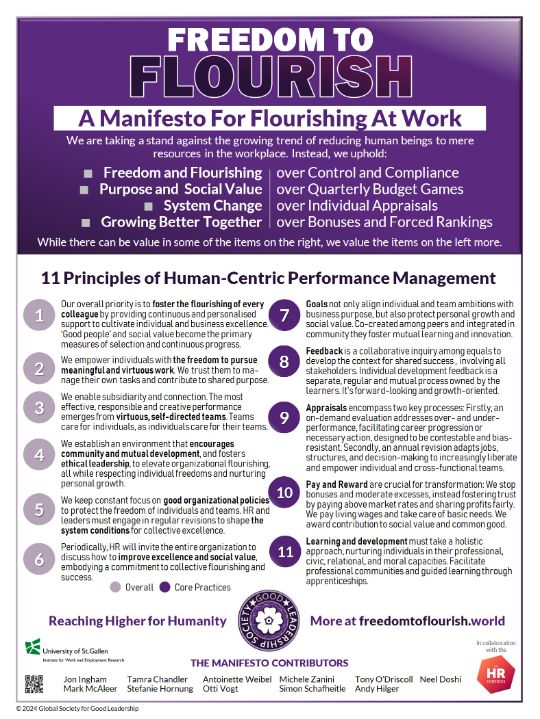
THE STORY BEHIND THE MANIFESTO
YOUR FEEDBACK ON THE MANIFESTO
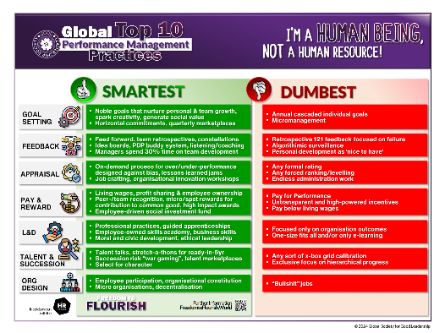
COMMENTS ON page 1: Maxims and core principles
- The strapline A Manifesto For Flourishing At Work repeats Flourish so might be redundant i.e. if combined with the next line: A manifesto for taking a stand against……………
- Comment on page one: I had previously suggested something along the line of - Equip your people managers with the skills and confidence to facilitate impactful conversations. I think a key principle needs to cover the critical dynamic between a colleague and his/her team leader, together with how an organisation should/must equip team leaders with the right skills and confidence etc
- Overall comment is that some of the principles are quite lengthy and combine different constructs/themes, so might be an opportunity to simplify the language and reduce the wordcount on the actual principles – appreciate this is a challenge when combining several different brilliant ideas! What is our yardstick test for a great principle?
- Principle 1. Good people and social value might not be immediately understandable for the audience, so perhaps each principle needs to pass the ‘Sun Reader’ test as a minimum? Continuous progress could be continuous learning, which removes the hierarchical implication of progress. I really like the notion of to foster the flourishing of every colleague.
- Principle 3. Bit convoluted this one, as had to read it several times! Perhaps self-directed teams is the essence of this principle?
- Principle 5. Love this! Suggest delete ‘keep constant’. System could be confused for some with IT………..just saying. Overall, this principle is clear and actionable.
- Principle 6. Like this, though would take out ‘social value’ as we have not explained this anywhere i.e. could be the ‘how to / elaboration’ that comes down the track when people ask us how to apply the manifesto.
- Principle 10. Pay and reward is not limited just to transformation. Not sure I agree with stopping bonuses altogether, as surely the point is the basis on which bonuses are awarded i.e. collective endeavours and success?
- Principle 10. Have re-read and whilst there are some great thoughts in this one, it seems to be several principles packed into one?
COMMENTS ON page 2: best and worst practices
- Not sure the smartest and dumbest language works in the context of flourishing? It could switch the reader off, especially if they have personally advocated for practices on the right! Perhaps practices which are positive / enablers and those practices that hinder / block flourishing?
- We perhaps need to say something about HR IT systems as being enablers and not an off the shelf design.
- Goal setting could imply imposed, so defining/agreeing goals? Like horizontal commitments as this speaks to joined up E2E processes. Could make mention of the customer/client i.e. outcomes that really make a difference? On the negative side thinking about micromanagement, something about excessive KPIs and reporting? Is there also something positive around team-based goals which encourages collaboration and alignment around the common purpose and collective value?
- Feedback could be changed to Feed forward? Positive practices are self-reflection and review, 360 Feedback for development only, mentoring as well as coaching. Hindering practices: Letting colleagues struggle without in the moment coaching and support.
- Appraisal is such a loaded term, so could we think of a different language such as success / flourishing conversations?
- Appraisal: Love the on-demand thought, as this addresses the point about not letting new hires/poor performers flounder and drown. Something around learning goals for the individual and or the community as a whole?
- Appraisal: Do we need to differentiate between the performance (How am I doing against expectations/standards for the current role) versus potential (where I would like to go next if I can)? This could also include job enrichment practices i.e. the introduction of AI may seem a threat, however, by removing routine administrative work, the job could be redesigned to include higher value more intrinsically rewarding work. Hindering practices: Agree on the points you have plus using the annual ‘appraisal’ for downsizing/rightsizing exercises.
- Pay and Reward: is a very broad topic, however, I think on the positive side we could have something on the disparity between reward for the top team and the lowest level roles should reflect the values of your organisation, commitments to shareholders and society at large.
- Pay and Reward: Could also mention equal pay/fairness from a DEI standpoint.
- Pay and Reward: Hindering practices: NB Untransparent should b non-transparent or use opaque. I would add not putting salary levels on job adverts, not sharing (internally at least) pay bands so that colleagues can plan career moves. The other big one in terms of disparity is paying new hires top dollar and ignoring loyal long serving high performers.
- L&D – Not just apprenticeships but also schemes for all categories of entrants e.g. Graduates and experienced hires.
- L&D: Positive practices: structured onboarding approach, perhaps with a buddy. For leaders in the past, I have facilitated assimilation workshops which proved very effective. Learning curriculums (or learning pathways) which include blended learning elements i.e. not just eLearning. Leadership development which is experiential in nature e.g. action learning based and cross functional i.e. stimulates the building of social networks across the organisation. Secondments to other organisations perhaps even charities which speaks to the moral and civic aspects.
- L&D: Where do we factor in career development – L&D for being effective in the current role and development to optimise potential for future larger / different roles?
- L&D Bad practices: eLearning point is spot on! Another (picked up from the HR Technology Conference) is that AI is not a magic L&D bullet. Getting the basics right (70:20:10 – which I know is flawed but quick shorthand) with a solid learning needs analysis is so often missing in organisations. Competency and skills frameworks as a cottage industry is another! (Positive – coherent frameworks/taxonomies not tied to banding/grading that have skills by proficiency level)
big thanks to all those who already provided their feedback!
- Mark McAleer
- Michele Zanini
- Andy Hilger
join the campaign
The Freedom to Flourish Campaign
Start the conversation about performance management at your own organisation.
Bring together HR and business leaders to develop new and better practices.
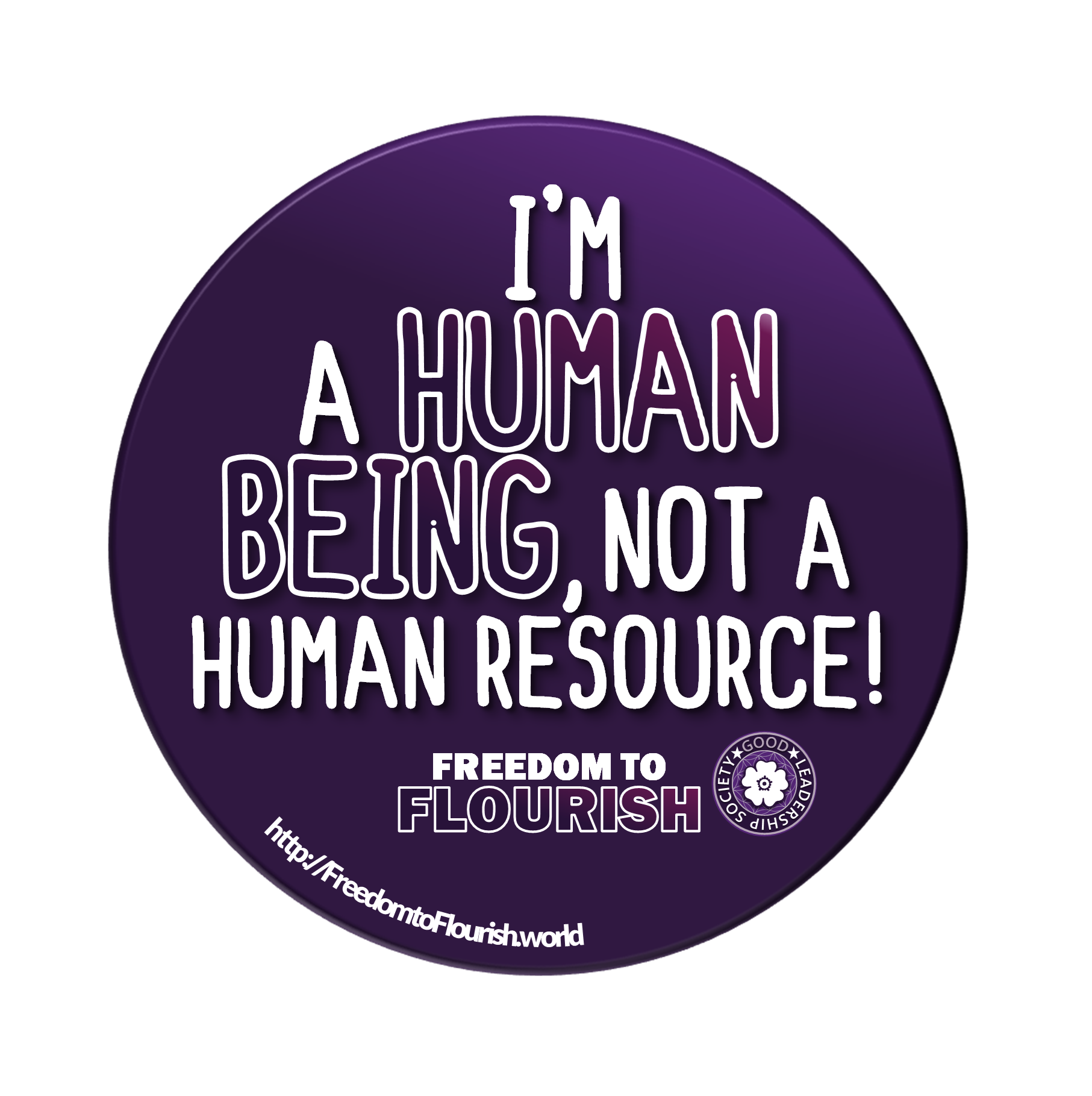
CAMPAIGN TESTIMONIALS (Click images to play the videos)
RESEARCH & DEVELOPMENT
Performance Management is Broken
Performance management is at the very heart of the organization, serving as THE vital connection between people and purpose of the business.
Get access to decades of lessons learned by researchers and practitioners championing innovative solutions to drive organizational flourishing.
Performance Management Practices Fail To Deliver
The power of research demonstrating the shortfalls of tradtional performance management is crushing. Overall, the verdict is clear: there is little to no correlation between individual performance rankings and business results.
- An overemphasis on SMART goals can lead to undermining of adaptive, innovative and entrepreneurial behaviors (see for instance Ordonez et al 2009)
- An overemphasis on stretch, (over-)ambitious goals can lead to unwanted work intensification, stress and unethical behaviors (see for instance Schweitzer et al 2017)
- Performance feedback does not work (Kluger et al 1996; DeNisi et al 2017); learning oriented meaningful conversations do (see for instance Budworth et al 2015)
- Performance appraisal - ratings and rankings - are not accurate, create resistance, limit learning and are not linked to organisational performance (see for instance Murphy 2019)
- High powered incentives often create misalignment (see for instance Roberts 2010), may undermine intrinsic motivation (see for instance Buch et al 2016), reduce contextual and creative performance, may lead to unethical behaviors (see for instance Park et al 2022) and create psychological as well as system-maintenance costs (see for instance Larkin et al 2012)
- "High performance work practices" (in particular those aimed at motivation) when corrected with the costs created seem to undermine organisational performance (Kaufman 2012; Ho et al 2019)
Everybody Hates Performance Management
In spite of significant efforts by HR and business leaders, performance management remains a challenge.
- Only 14% of employees strongly agree that performance reviews inspire them to improve.
- Only 26% of employees say they received feedback that helps them do their job better
- Only 23% of organisations say performance accountability reflects employee contributions
- Fewer than one-third of employees believe the review process is fair.
- Only 18% of HR leaders consider performance management to be effective.
- 60% of HR executives give their own performance management systems a grade of C or below.
- Only 8% of HR executives feel performance accountability made contribution to business
- 98% of HR managers believe yearly evaluations are not useful.
- Over 90% of employees are dissatisfied with appraisal systems
OUR RESEARCH
THE STARTING POINT
F**K THE FUTURE OF WORK: OUR TRAGIC FAILURE TO UPHOLD [OUR OWN] HUMANITY
BY ANTOINETTE WEIBEL AND OTTI VOGT
And we firmly believe that this requires leadership. Leaders, across the board, need to not only deepen their understanding of what constitutes good work and actively contribute to its realization, but they must also scrutinize their own role within organisational systems, and assess their own capacity for transformative change, both personally and institutionally.
Seizing the opportunity of the recent global HR Congress, we turned the spotlight on a pivotal group of leaders – those in HR. Why HR? Because, more than any other leaders, we believe HR leaders should be the custodians of good work. After all, HR is all about people, isn’t it? But, here’s the twist: when Antoinette and I delved into the data, to be perfectly honest, we didn’t really see it. Thus, we decided to kick off the Congress with a gentle provocation: we suggest the future of work is looking increasingly bleak, because leaders – particularly those in HR – find themselves increasingly stuck.
Please find more information and recordings from the HR Congress Horizons World Summit 2023 here: https://horizon.hr-congress.com/. A big thanks to organisers, speakers and participants for all the superb conversations!
Please visit the Global Society for Good Leadership LinkedIn page and hr.leadershipsociety.world for more details, references and further materials.
PERFORMANCE MANAGEMENT FOR FLOURISHING: AGILE, HUMAN-CENTERED, SOCIAL, TECH-ENABLED
BY JON INGHAM
- One notable shift has been the move away from traditional, rigid performance appraisals towards more continuous and agile feedback systems. Forward-thinking companies recognize the importance of ongoing communication and development, fostering a culture of regular performance discussions rather than annual evaluations.
- Innovative approaches also emphasize human-centric strategies. Organizations are increasingly focusing on individual growth, aligning personal development goals with broader organizational objectives. This shift from a top-down to a collaborative approach empowers employees, fostering a sense of ownership and engagement in their performance journey.
- Another noteworthy aspect is the increasing emphasis on social and team-oriented practices. Rather than solely focusing on individual achievements, there is a growing recognition that many goals are achieved through teamwork and collaboration. As a result, performance management practices are adapting to incorporate team-based metrics and evaluations, encouraging a sense of camaraderie and mutual accountability and fostering a positive team culture where individuals are not only accountable for their own performance but also contribute to the success of the team as a whole.
- Additionally, technology plays a pivotal role in this evolution. The advent of data analytics and AI-driven tools allows for more objective and real-time performance assessments. These tools not only streamline the process but also provide actionable insights for continuous improvement and make it easier for employees to engage.
BEYOND THE HYPE: EXPLORING THE PERSISTENT FAILURES IN PERFORMANCE MANAGEMENT
BY ANTOINETTE WEIBEL
- Goal Setting: Even with the introduction of OKRs, goal-setting remains highly prescriptive, often hindering rather than enhancing performance.
- Performance Feedback: Contrary to expectations, performance feedback fails to create a substantial impact on actual performance
- Ranking and Ratings: While intended to enhance performance, practices like ranking and ratings, have negative effects and contribute to "sorting" behaviours especially in the long-term
- Transparency: Excessive transparency, though intended to promote accountability, often leads to gaming behavior, undermining the genuine improvement of performance.
- Performance Evaluation: Despite ongoing innovations, performance evaluation consistently fails to delivering results, prompting a need for reevaluation.
- Meritocracy: Antoinette challenges the notion of meritocracy, emphasizing that small biases are perpetuated and amplified, preventing the realization of true merit-based systems.
- Pay for Performance: The link between pay and performance remains tenuous. Pay for performance often reduces both intrinsic motivation and actual performance, while generating high hidden costs.
- CEO Pay: Antoinette suggests that outrageously high compensation for CEOs may explain the persistence of performance-contingent pay, while much research demonstrates its ineffectiveness.
In summary, Antoinette underscores the crucial disconnect between innovative performance management practices and their real-world impact. Her call for closer collaboration between practitioners and academics emphasizes the need for a more nuanced, evidence-based approach to truly drive positive change in performance management.
A NEED FOR INNOVATION
BEYOND RATINGS: A PARADIGM SHIFT IN PERFORMANCE MANAGEMENT!
BY TAMRA CHANDLER
With a laser focus on the appraisal process, Tamra's message was crystal clear: if you still use traditional ratings, normal distribution curves, or forced levelling, just stop! Now! It's simply not good enough to rely on outdated methods. Instead, Tamra offered invaluable insights from decades in the field on fostering fairness, providing developmental feedback, and making reward systems more effective and transparent.
This session is an absolute treasure trove of wisdom, packed with practical lessons, innovative ideas, and actionable strategies for transforming performance management. Trust us, you won't want to miss it!
Tamra is a globally recognized thought leader, author, and speaker celebrated for developing innovative and transformative approaches to maximizing organizational performance. With over three decades of strategic collaboration spanning diverse sectors, she has been at the forefront of reshaping HR practices and organizational paradigms. Formerly a Partner at EY, she founded PeopleFirm LLC in 2009, earning accolades such as Forbes Magazine's "America’s Best Management Consulting Firms" and establishing it as a prominent women-owned enterprise in Washington. She is the esteemed author of three influential books on performance management: "How Performance Management Is Killing Performance"; "Rethinking Performance Management"; and "FEEDBACK (and Other Dirty Words) Why We Fear It, How to Fix It".
THE FUTURE OF PERFORMANCE MANAGEMENT: TOTAL MOTIVATION THROUGH SKILL-BASED APPRENTICESHIPS
BY NEEL DOSHI
Regarding performance, Neel highlights the crucial difference between tactical and adaptive, demonstrating how many organizations focus solely on tactical performance. Quoting Deepak Malhotra, he points out that the issue eventually shifts from "the mouse being in a maze" to "the maze being in the mouse."
In discussing what drives performance, Neel reveals that the secret lies in "total motivation." With numerous insightful details, he outlines six types of motives and explains how the performance management ecosystem can either positively or negatively impact their balance. Indirect motives often decrease performance, while learning is the only sustainable way to enhance it. This principle extends to goals as well—learning goals consistently outperform performance goals. Moreover, ratings typically exacerbate the problem.
To scale performance, senior leaders must first change their own mindset, which often focuses solely on tactical performance. They must then systematically and scientifically link performance management, motivation, and performance to cultivate cultures where organizations can truly flourish. Finally, they should leverage available tools, including AI, to enhance the system.
FROM DATA TO WISDOM - NAVIGATING THE RISKS AND REWARDS OF AI IN PERFORMANCE MANAGEMENT!
BY SIMON SCHAFHEITLE
In our discussion, we first examine the broader challenges of performance management highlighted in recent academic research. Then, we deep dive into the technological advancements in AI and automation, uncovering the significant risks organizations encounter today, such as surveillance and algorithmic bias, and the potential rise in workload and stress. However, amidst these challenges, we also explore the exciting opportunities technology offers - from data-driven insights to personalized development or greater freedom from mundane and repetitive work.Simon offers us a plethora of concrete examples from real-world applications and companies and prompts us to consider how we can responsibly harness innovation to empower employees and propel organizational success. Digital gains, according to Simon, require analog wisdom.
Simon Schafheitle is Assistant Professor for Human Resource Management and Artificial Intelligence at the University of Twente, specializing in the impact of technology on organizational control and human trust relationships in digital work settings. He earned his PhD from the University of St. Gallen in 2020, focusing on 21st-century workplace architecture and trust dynamics. Simon has received prestigious awards for his innovative research and practical contributions to the field.
NEW PRACTICES WANTED
FROM “MANAGING PERFORMANCE” TO “UNLEASHING POTENTIAL”: LESSONS FROM THE VANGUARD!
BY MICHELE ZANINI
Throughout the discussion, Michele highlights a series stimulating examples from many highly innovative organisations, including Buurtzorg, SpaceX, Haier, Gore, Nucor, Ingersoll Rand, Oktogonen and others.
[ABOUT MICHELE ZANINI]
Michele is a co-author of the Wall Street Journal Bestseller "Humanocracy," advocating for bold, entrepreneurial organizations that prioritize creativity and initiative over top-down power structures. With a background as a senior consultant at McKinsey & Company, he has extensive experience in large-scale transformation initiatives and research on emerging management practices. He is also a prolific writer for publications like the Harvard Business Review and a sought-after speaker at conferences worldwide.
THE PERFORMANCE PAY DILEMMA: TACKLING COMPENSATION CHALLENGES!
BY STEFANIE HORNUNG
Moving on to "New Pay", it contrasts traditional pay structures with new approaches across seven dimensions, illustrated through examples. Finally, it discusses the dilemmas encountered on the New Pay journey and proposes a compass for addressing them, along with common challenges for all compensation approaches.
[ABOUT STEFANIE HORNUNG]
Stefanie Hornung is an influential freelance journalist renowned for her expertise in new management practices. She has deep insights into HR and is particularly recognized for her expertise in pay structures, having co-founded the New Pay Network and the New Pay Collective. She is a former key member of Europe's largest trade fair for HR management and has authored multiple books on compensation, contributing significantly to discussions on innovative pay models.
REFLECTIONS ON PERFORMANCE MANAGEMENT: LESSONS FROM THE HR TRENCHES
BY MARK MCALEER
We embark on a revealing journey through the HR trenches to dissect the intricacies of performance management. Get ready for the gritty realities and hard-earned insights from the frontline of HR operations: from the challenges of objective setting to the pitfalls of assessments and feedback, from the practicalities of succession to innovations in L&D or pay! Brace yourself for an illuminating exploration of HR wisdom, including and beyond 9-box matrices, PiPs and PDPs! In summary, Mark emphasizes that performance management remains critical for organizational success. Yet, he concludes, "businesses often have exactly the performance management they deserve," which should be enough to make executives pay more than lip service to its urgent transformation.
Mark McAleer stands as a beacon of progressive thought in leadership development and business transformation, boasting a wealth of expertise in HR and talent management on a global scale. With a distinguished executive career traversing diverse sectors like ICT, telco, oil & gas, FMCG, marketing, and finance, Mark currently serves as the Organization Solutions Director at BDO. Additionally, he is Visiting Lecturer on the MBA program at Hult Business School.
NEW PRACTICES WANTED
THE REAL VALUE OF WORK: PEOPLE AS OUR MOST IMPORTANT ASSETS
BY PETER CAPPELLI
Peter’s analysis sheds light on how once empowering concepts like "agile" have been warped into tools for relentless pressure, while HR struggles to defend its original mission of employee advocacy. He points out that CEOs often announce layoffs not for operational necessity, but to appease Wall Street, causing needless stress within organizations. Peter challenges HR to reject these top-down pressures and champion organizational resilience, rather than perpetuating workforce churn under the guise of efficiency.
Calling HR the "last line of defense" against dehumanization, Peter urges professionals to resist financial mandates that harm the workforce and, ultimately, the company itself. His rallying cry is for HR to reclaim its role as a champion for sustainable growth, designing workplaces that prioritize employee well-being over fleeting metrics. As Peter states, “If you’re going to make business about efficiency, at least make sure it’s efficient—constant restructuring isn’t.”
[ABOUT PETER CAPPELLI]
Peter Cappelli is a prominent scholar and thought leader in the fields of human resource management and organizational behavior. He serves as the George W. Taylor Professor of Management at the Wharton School of the University of Pennsylvania. Peter has authored numerous influential books and articles, including "The Least Important Asset," where he examines the often-overlooked value of human capital in business strategy. His research focuses on workforce management, talent development, and the implications of labor market dynamics for organizations.
OUR DEVELOPMENT
Creating Freedom to Flourish
Traditional performance management often relies on some variant of "pigeon training"
More than new practices, we must develop a new paradigm to enable organizational flourishing
What is Performance Management
Performance management is a systematic and continuous process that involves planning, monitoring, developing, reviewing, evaluating and rewarding the performance of individuals or teams within an organization. It aims to optimize individual and team performance, align behaviours with strategic goals, enable professional development, and thus contribute to the overall success of the organization.
Key practices of performance management typically include
- Setting “smart” objectives
- Providing regular performance feedback
- Appraising performance against established criteria
- Identifying areas for improvement and development
- Recognizing and rewarding achievements (or managing the consequences of underperformance)
What is the problem with Performance Management
Traditional performance management often relies on some variant of "pigeon training": a combination of a utilitarian performance definition, emphasizing profit maximization and financial returns, and an engineering approach to performance optimization:
- It is assumed that performance can be accurately forecasted, attributed and measured, that all required activities and outcomes can be predefined, and that causes of individual performance are easily determinable (and manipulable). Total performance is treated simply as the aggregate of individual and unit achievements.
- On that basis, financial targets are decomposed and cascaded to organizational units, teams and roles, guided by the annual budgeting cycle. Then, “cybernetic” controls are established through governance cycles, both at organizational and individual/unit level.
- Individual behaviours are assumed to be rational and selfish. Performance results from a linear combination of factors, such as personal ability, motivation and opportunity. Hence, at the individual level, performance can be optimised by: a) ensuring a match between individual competencies and role requirements, b) alignment of individual and corporate purpose. Motivation can be stimulated through carrots and sticks, i.e. extrinsic rewards and punishments. On that basis, appropriate incentives are established.
The Quest For A New Paradigm
Our hypothesis is that the functionality of performance management within an organization is intricately tied to the prevailing "action logic," a framework about how the "world works" shaped by the fundamental beliefs of founders or leaders. This encompasses three key dimensions: a) the values associated with the concept of "performance"; b) a set of beliefs regarding how organizational performance interconnects with individual behaviors; and c) an understanding of the ways in which individual behavior can be effectively influenced.
While traditional performance management has already faced considerable critique, in our view much of it does not change the prevailing "action logic". As a result, many innovative practices ultimately serve as "lipstick on a pig": they legitimise and perpetuate a morally unsustainable paradigm.
- Ethically, a predominantly utilitarian definition of performance as profit maximisation mostly goes unquestioned. The broader CSR movement has sometimes challenged a merely instrumental purpose, but without much success. Our focus on "flourishing" will demand a more substantive review of what we mean by performance, for whom, and how it can be measured.
- From an ontological standpoint, performance continues to be viewed as a property of individuals or teams, rather than an emergent organisational property shaped by more intricate mechanisms both within the company, as well as in the broader market and ecosystem. Our revision requires a more holistic approach, including organisational design and governance, in order to determine what it means to "cultivate" flourishing within a social system.
OUR LASTEST MANIFESTO VERSION

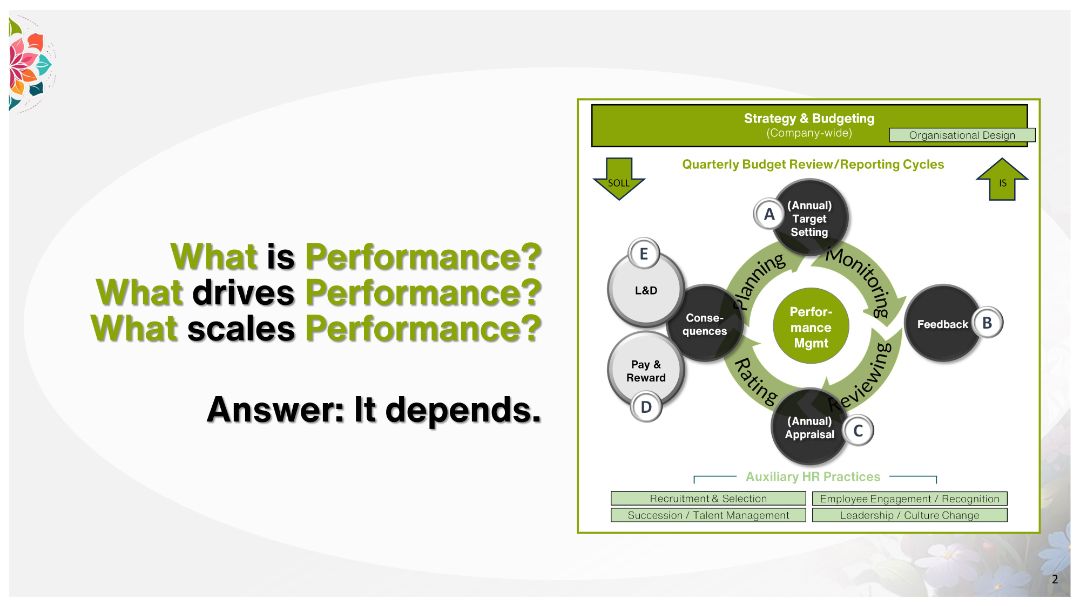
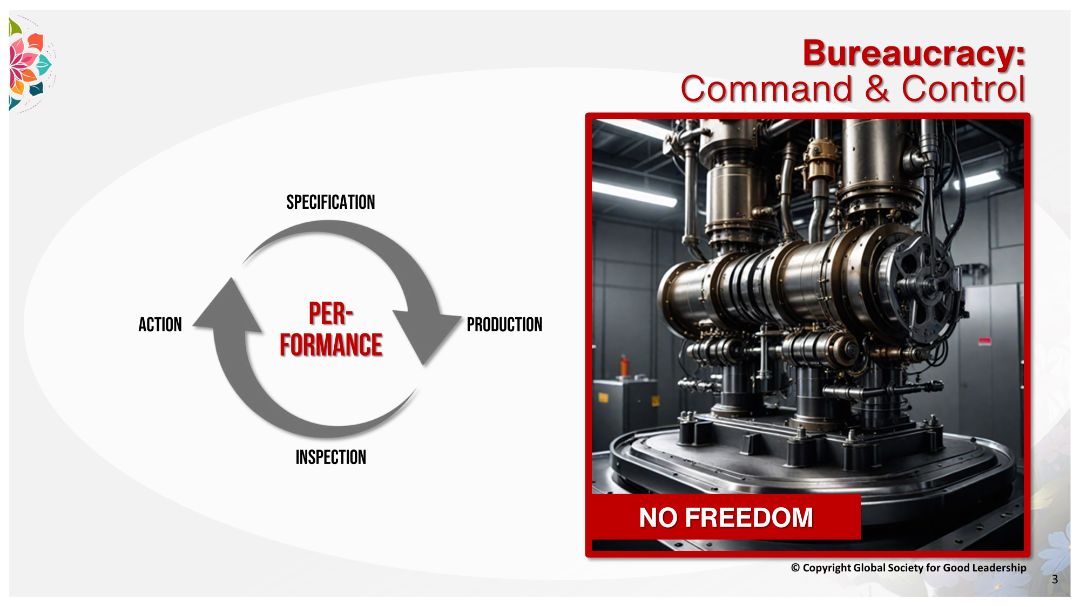
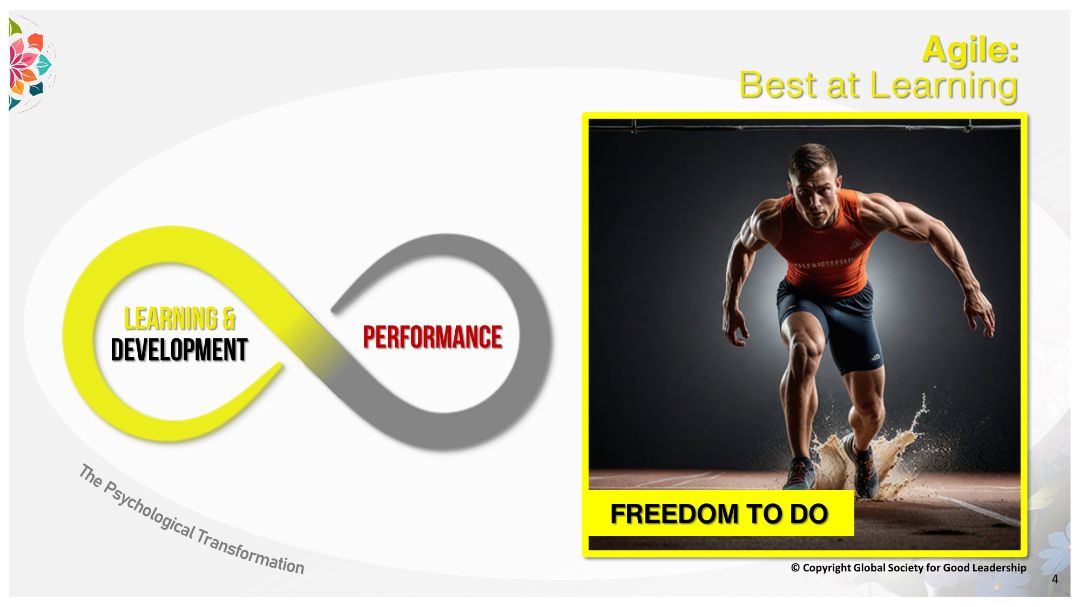
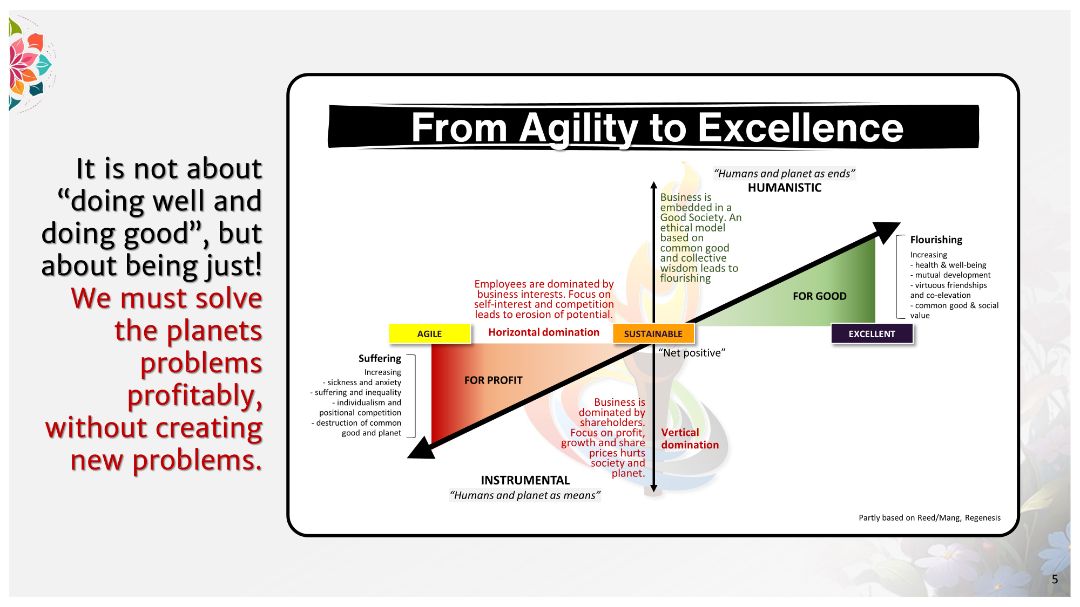

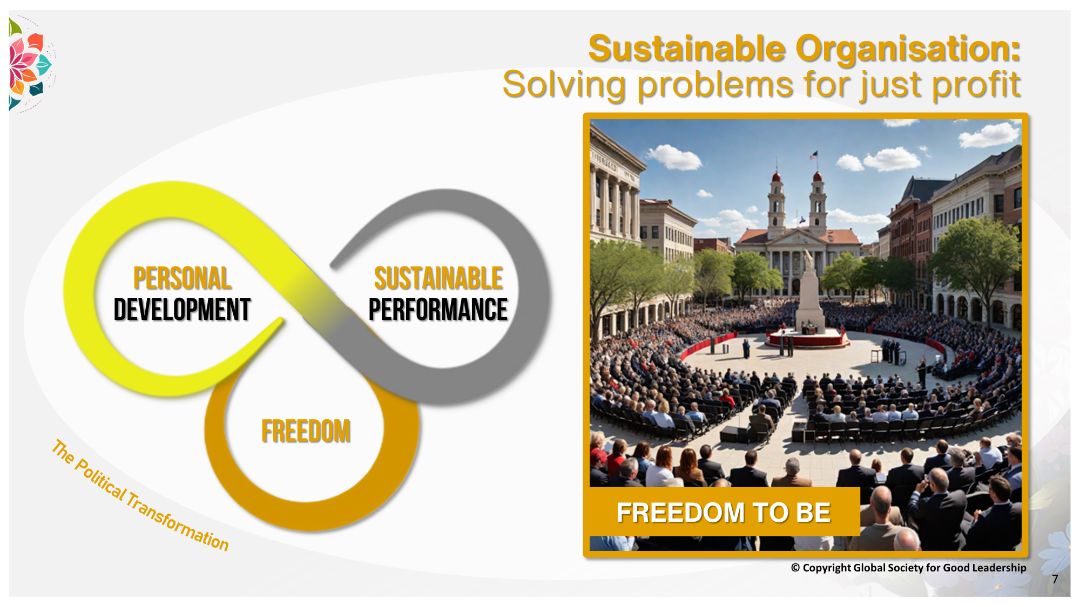
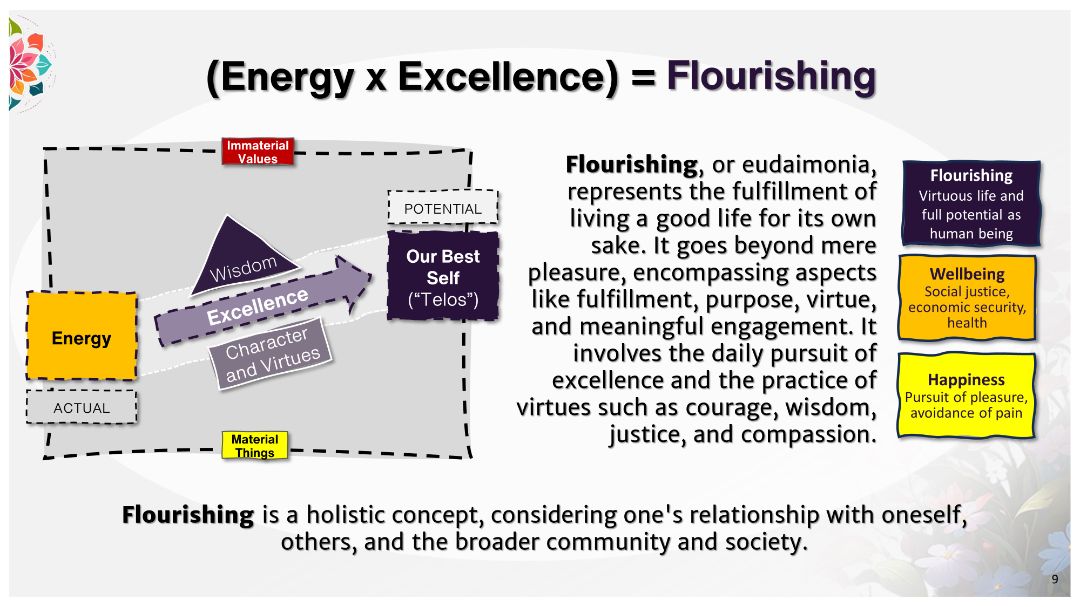
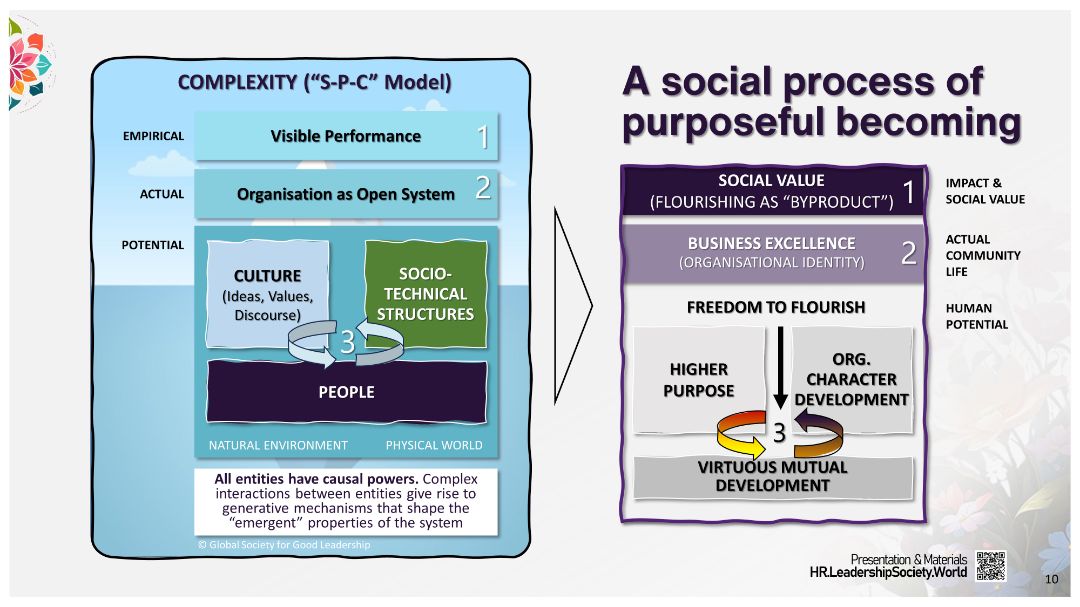
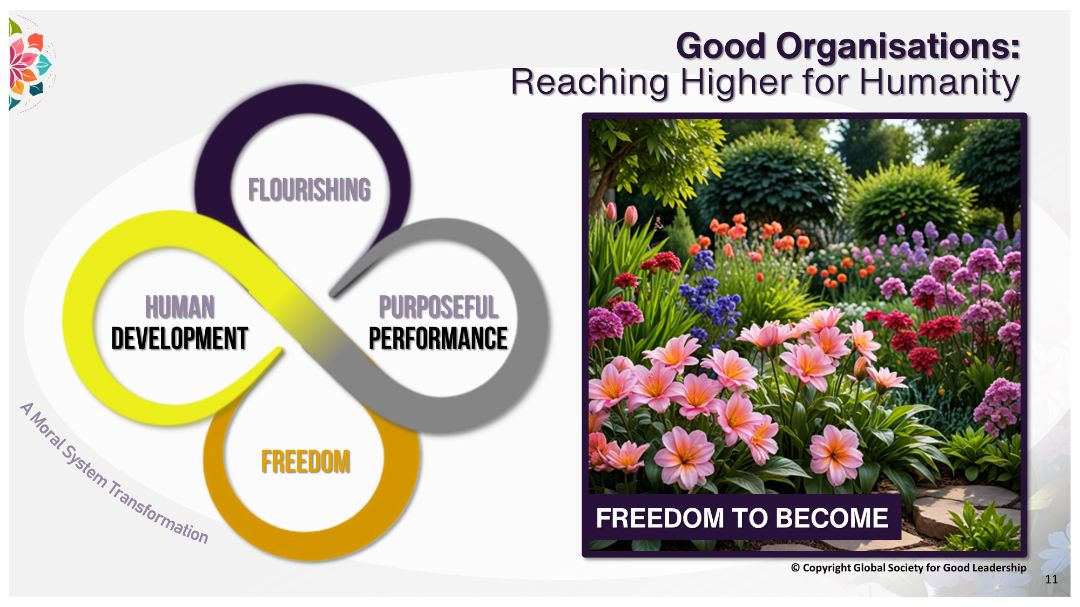
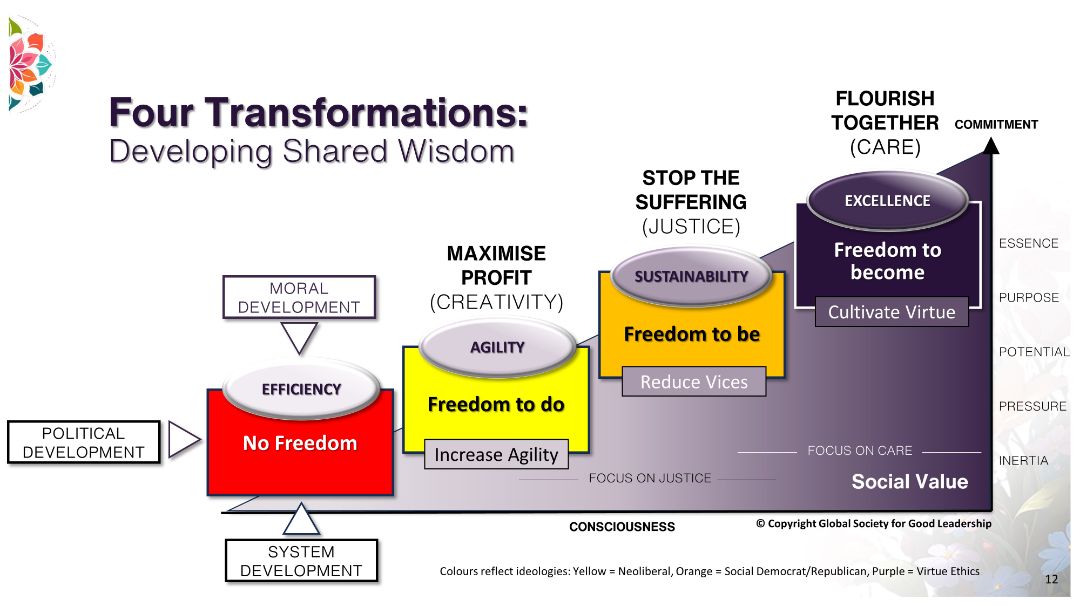
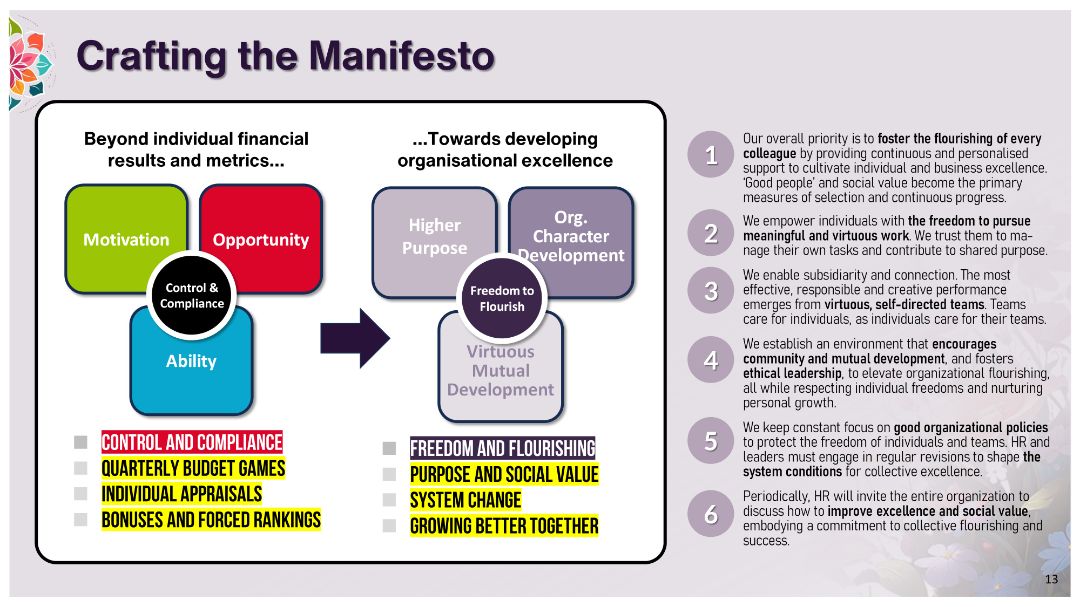
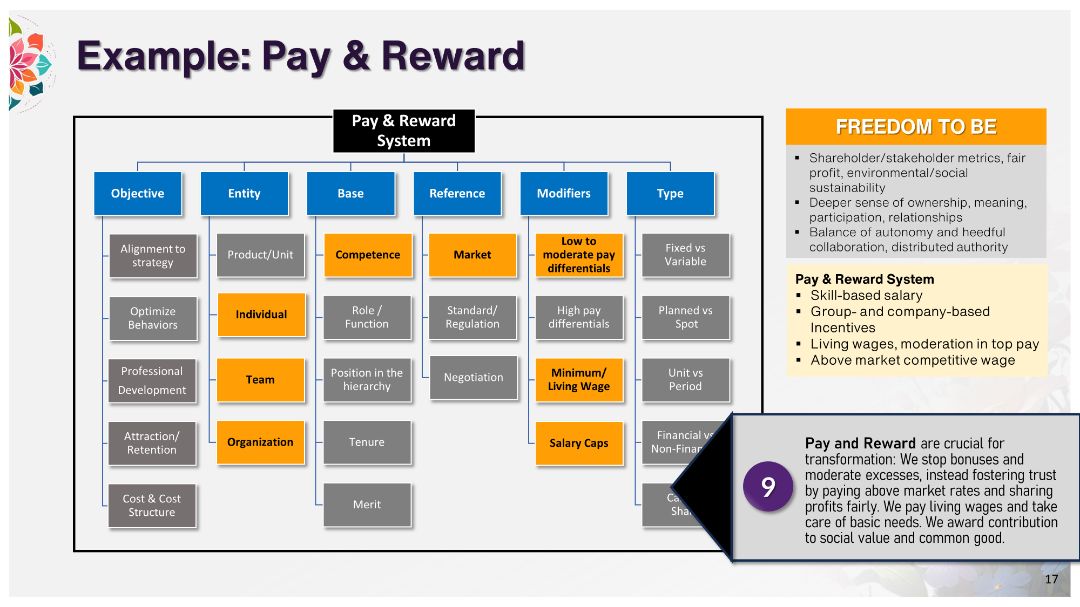
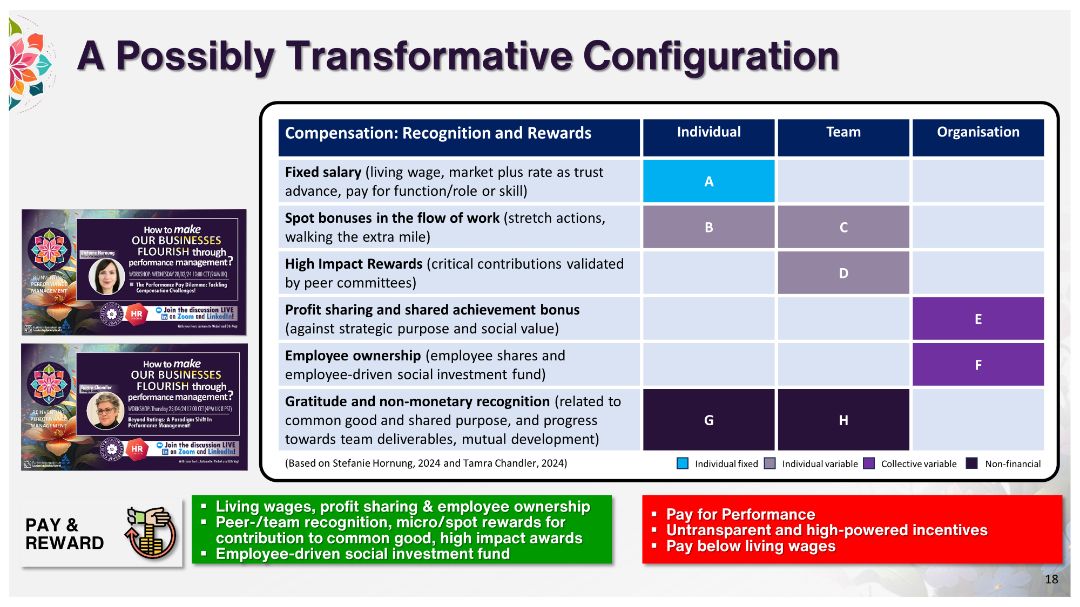
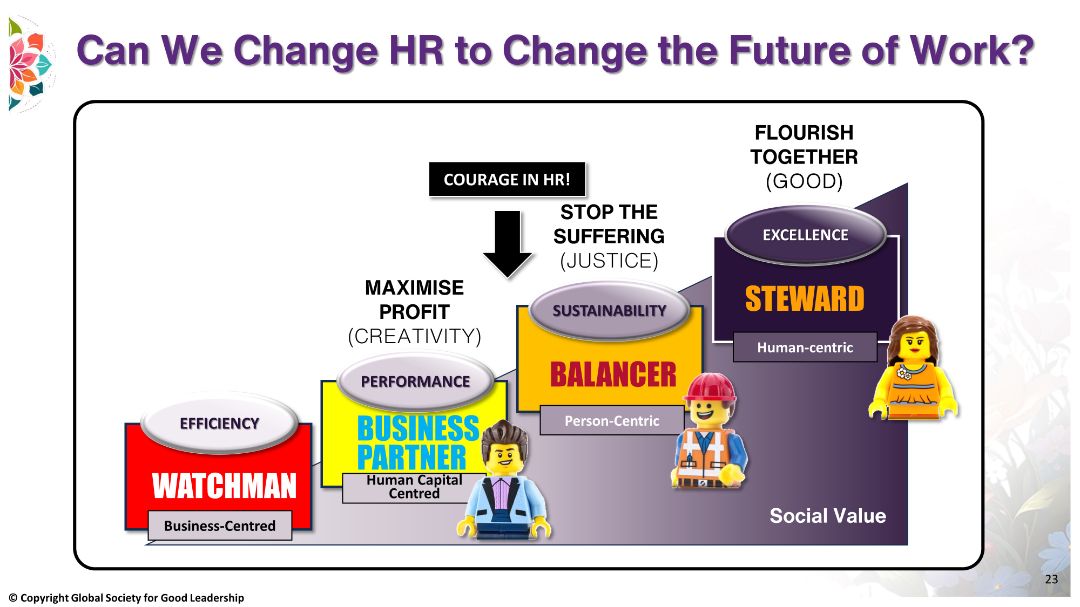
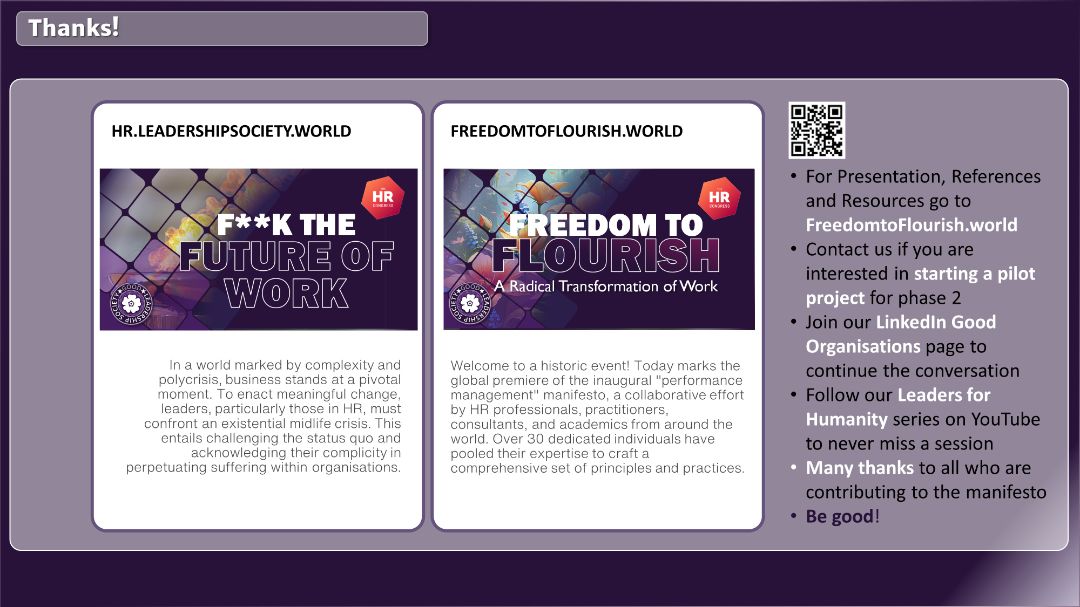
The Way Ahead
On this basis, we are pursuing a dual approach to performance management reform: Firstly, we are critically examining contemporary practices to assess their effectiveness within the "traditional" logic, drawing insights from academic research. Secondly, we are deliberately revising the conventional logic and developing new tools and processes that resonate with a novel approach centered around organizational flourishing. This parallel approach enables us to propose innovative solutions that both align with a redefined organizational logic while also addressing existing shortcomings and lessons learned from established practices.
the global community
Join The Global Manifesto Community
“There is no power for change greater than a community discovering what it cares about.” (Meg Wheatley)
Build on hands-on lessons learned from social and business transformation.
Change is (Too) Slow
Improvements in Performance Management are glacial. We believe that several factors are contributing to the lack of progress in performance management evolution. One important aspect is that a coherent, credible and practical alternative is missing. Therefore, our mission is to bring together cutting-edge innovative practices with profound insights from the best of academic research, while fostering new perspectives through hands-on experimentation.
The project unfolds across three distinctive phases:
- In phase 1, the emphasis is on research and development to craft an innovative performance management manifesto for presentation and agreement at the HR World Congress in Porto in May 2024.
- Following this, phase 2 involves the ongoing refinement of the manifesto through collaborative efforts with pilot companies. Updates and findings are to be shared at the HR Horizons Conference in November.
- Phase 3 extends the project's scope to encompass broader implementation and support of the methodology throughout the 2025 performance management cycle.
Making an Impact
In order to support changemakers across HR leaders, business leaders and consultants we are aiming to develop a number of concrete deliverables:
- Performance Management Manifesto (Value proposition & principles)
- Piloting programme with interested forward-thinking companies
- Novel performance management toolkit & good/bad practice catalogue
- Training materials & support for Continuous implementation
- Promotional campaign
- Alliance of early adopters & partners
PROJECT AMBASSADORS
GLOBAL MEDIA PARTNERS
PROJECT COLLABORATORS
resources
Looking for further insights?
Find here all the presentations from our research phase.
Dive into further academic research on performance management.

community presentation archive
Download the presentations you are interested in by clicking on the PDF icon.
F**K THE FUTURE OF WORK: OUR TRAGIC FAILURE TO UPHOLD [OUR OWN] HUMANITY
GO TO THE EVENT PAGE WITH RESOURCES & RECORDING
PERFORMANCE MANAGEMENT FOR FLOURISHING: AGILE, HUMAN-CENTERED, SOCIAL, TECH-ENABLED
BEYOND THE HYPE: EXPLORING THE PERSISTENT FAILURES IN PERFORMANCE MANAGEMENT
BEYOND RATINGS: A PARADIGM SHIFT IN PERFORMANCE MANAGEMENT!
THE FUTURE OF PERFORMANCE MANAGEMENT: TOTAL MOTIVATION THROUGH SKILL-BASED APPRENTICESHIPS
(not yet available)
FROM DATA TO WISDOM - NAVIGATING THE RISKS AND REWARDS OF AI IN PERFORMANCE MANAGEMENT!
FROM “MANAGING PERFORMANCE” TO “UNLEASHING POTENTIAL”: LESSONS FROM THE VANGUARD!
THE PERFORMANCE PAY DILEMMA: TACKLING COMPENSATION CHALLENGES!
REFLECTIONS ON PERFORMANCE MANAGEMENT: LESSONS FROM THE HR TRENCHES
ACADEMIC RESOURCES
PRACTITIONER RESOURCES





























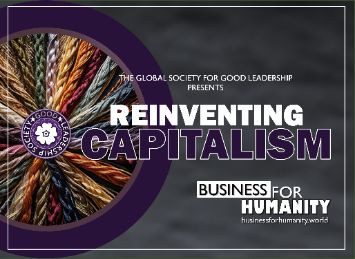




 .
.